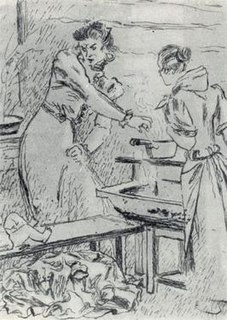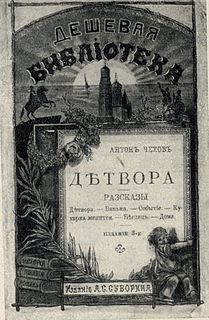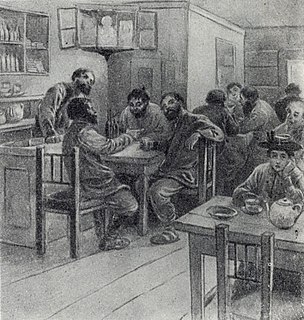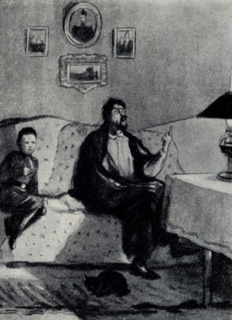| "The Complaints Book" | |
|---|---|
| Author | Anton Chekhov |
| Original title | "Жалобная книга" |
| Country | Russia |
| Language | Russian |
| Published in | Oskolki (1884) |
| Publisher | Adolf Marks (1901) |
| Publication date | 10 March 1884 |
"The Complaints Book" (Russian : Жалобная книга, translit. Zhalobnaya kniga) is a short story by Anton Chekhov, first published in the No. 10, 10 March [old style] 1884 issue of Oskolki , signed A. Chekhonte (А. Чехонте). It was included by the author into the Volume 1 of the Adolf Marks-published Chekhov's Collected Works (1899). [1] The story was translated into Bulgarian and Czech languages during Chekhov's lifetime. [2]

Russian is an East Slavic language, which is official in the Russian Federation, Belarus, Kazakhstan and Kyrgyzstan, as well as being widely used throughout Eastern Europe, the Baltic states, the Caucasus and Central Asia. It was the de facto language of the Soviet Union until its dissolution on 25 December 1991. Although, nowadays, nearly three decades after the breakup of the Soviet Union, Russian is used in official capacity or in public life in all the post-Soviet nation-states, as well as in Israel and Mongolia, the rise of state-specific varieties of this language tends to be strongly denied in Russia, in line with the Russian World ideology.

Romanization of Russian is the process of transliterating the Russian language from the Cyrillic script into the Latin script.

A short story is a piece of prose fiction that typically can be read in one sitting and focuses on a self-contained incident or series of linked incidents, with the intent of evoking a "single effect" or mood, however there are many exceptions to this.
The story's short introductory paragraph informs the reader of a complaints book which is there on the desk at a railway station. There are twenty entries in it, none of them having anything to do with the book's purpose.
Chekhov's story was inspired by the complaints book of one of the stations of the Donetsk Railway that had amused him. Although the names in the story are fictitious, and the author changed some of them when he had his work published, a lost cigarette case in one of the entries is asked to be given to "Andrei Egorich". It is the name of the real postmaster of Voskresensk, the town where Chekhov worked back then. [2]
A postmaster is the head of an individual post office. When a postmaster is responsible for an entire mail distribution organization, the title of Postmaster General is commonly used. Responsibilities of a postmaster typically include management of a centralized mail distribution facility, establishment of letter carrier routes, supervision of letter carriers and clerks, and enforcement of the organization's rules and procedures.
Voskresensk is the name of several inhabited localities in Russia.
"The Complaints Book" quickly became popular with a wide range of readers. [3] It became divided into quotations, the most popular of which proved to be its final phrase: "Even if the seventh one, you are still a fool," a reply to the penultimate entry, signed: "Chief station master's deputy, Ivanov the Seventh." It is usually said about somebody who is decorated with titles and honours that do not fit their true nature. [4] It became an idiom in Russian language, and other writers put it in the speech of their characters: this was done, in particular, by Ivan Bunin in the "Inscriptions" and by Alexander Kuprin in "Staff-Captain Rybnikov". [5]

An idiom is a phrase or an expression that has a figurative, or sometimes literal, meaning. Categorized as formulaic language, an idiom's figurative meaning is different from the literal meaning. There are thousands of idioms, occurring frequently in all languages. It is estimated that there are at least twenty-five thousand idiomatic expressions in the English language.

Ivan Alekseyevich Bunin was the first Russian writer awarded the Nobel Prize for Literature. He was noted for the strict artistry with which he carried on the classical Russian traditions in the writing of prose and poetry. The texture of his poems and stories, sometimes referred to as "Bunin brocade", is considered to be one of the richest in the language.














